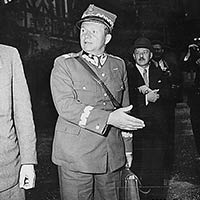Marian Frenkiel
Marian Tadeusz Frenkiel (1919 - 1995) - lawyer, soldier of the Red Army, prosecutor of the Supreme Military Prosecutor's Office in Poland in the Stalinist period.
He was responsible for conducting and overseeing military investigations. Accusing others in trials, he often demanded death sentences, e.g. in the case of Major Zefirin Machalli and promoted the thesis that if the facts are different than what the prosecution would like, so much the worse for the facts
.
Frenkiel were never responding to the defendants' explanations made during the court hearings, and for those defendants' who tried to testify about illegal methods of investigation - on the contrary - demanded a higher penalty, considering it an aggravating circumstance. This was the case with the complaint of Col Jan Kryska, tortured by GZI Main Directorate of Information of the Polish Army - a body of military counterintelligence operating in the People's Republic of Poland in the years 1944-1957, responsible, next to the Ministry of Public Security, for mass arrest, torture and repression among soldiers of the Polish Army, the Home Army, underground anti-communist organisation Freedom and Independence, National Armed Forces and civilian population. officers . At another hearing, the defendant Roliński was beaten so badly in custody that he had to be brought to the courtroom on a stretcher. Prosecutor Frenkiel did not even pay attention to the obvious use of illegal investigation methods.
Main Directorate of Information of the Polish Army - a body of military counterintelligence operating in the People's Republic of Poland in the years 1944-1957, responsible, next to the Ministry of Public Security, for mass arrest, torture and repression among soldiers of the Polish Army, the Home Army, underground anti-communist organisation Freedom and Independence, National Armed Forces and civilian population. officers . At another hearing, the defendant Roliński was beaten so badly in custody that he had to be brought to the courtroom on a stretcher. Prosecutor Frenkiel did not even pay attention to the obvious use of illegal investigation methods.
Contrary to the prosecutor's duty, he did not seek to clarify the contradictions or circumstances of unclear court cases. After all, the main purpose of the hearings was the conviction of the accused and not reaching the truth. It was the result that mattered. In the most cases, of the so-called "military conspiracy" and "Bydgoszcz case", he stright forewardly demanded high penalties, including the death penalty.
In 1956, he was a member of a commission examining the confidential burial sites of murdered prisoners. On the list of deceased there were many of his victims. The Commission did not resolved anything.

The prosecutor Frenkiel was not only a communistic criminal but also a very gifted bridge player. After the end of his career of a Stalinist executioner from behind the court list, he took up bridge professionally and won numerous podiums in Poland and Europe. He even won the world championship in team bridge in Orléans, United States. Even after the political changes in new, "free" Poland, he was the president of the Polish Sports Bridge Association.
For his services to the communist regime he was awarded the Knight's Cross of the Order of Polonia RestitutaOrder of the Rebirth of Poland, Order of Polonia Restituta - the second highest Polish civilian state decoration (after the Order of the White Eagle), awarded for outstanding achievements in the field of education, science, sport, culture, art, economy, national defense, social activity, service state and developing good relations with other countries. and the Gold and Silver Cross of MeritCross of Merit - Polish civil state decoration, awarded for merits to the State or citizens. The Cross of Merit was initially the highest award for civilians who, after Poland regained independence in 1918, distinguished themselves in their work for the country and society, fulfilling activities that went beyond the scope of their daily duties. The Cross of Merit comes in three degrees: Gold Cross of Merit, Silver Cross of Merit, Bronze Cross of Merit..
https://pl.wikipedia.org/wiki/Marian_Frenkiel
https://www.techpedia.pl/index.php?str=tp&no=36801